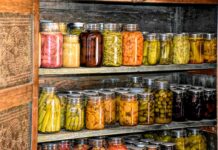Part Two. Read part one, part three and part four.
“Our engagement was announced. Resolved not to take my ring off my finger until our wedding day.” — Helen Myers, Jan. 5, 1930
In the early years of my paternal grandmother’s engagement to my grandfather, she kept a simple diary, revealing the sweet and spunky person who was so loved by so many. She wrote of her students, of writing a summer farewell poem entitled Close of School and her return to Ashland College for additional classes.
In early September, 1930, she wrote of a family reunion, noting, “I was re-elected secretary-treasurer after one year of poor work.”
She opened her one-room school Sept. 8, “My second year and I love it. I have 2 new pupils.”
Looking toward her April 1931 wedding, a few days later she writes, “Canned peaches, pears, corn, tomatoes and chili sauce to keep our hungry little family-to-be from starving next spring and summer.”
Today, it is difficult to fathom, but Helen at 20, had a choice to make: marry in hopes of becoming a mother soon, or remain single to pursue teaching, which she so clearly enjoyed. Society was harsh, using words like “spinster school teacher” to describe a single woman, even by age 25.
Tough choices
Marry, and the job would often be quickly given to a man. It was kind that the people of Mud College allowed Helen to marry on Easter Sunday, April 5, 1931, and finish out the school year with her beloved students.
After marriage, Helen quickly put her talents to good use in the home and on the farm, in church, and a few years later, in the school her children attended.
My dad, the first-born in 1932, recalled his mother overhearing a conversation he and his sister, Marilyn, had about some kids in their community who carried stones in their otherwise empty lunch pails, prompting teasing from some other students as they went hungry and humiliated.
It was said that the father of these children “drank up” all the grocery money, and health issues were a constant problem as the children were mistreated and malnourished. Helen started a crusade against hunger in the school, addressing the school board with a proposal she had drawn up to provide a small cafeteria where simple foods could be served to all students, not singling any particular children out.
Importance of nourishment
She felt compassion as well as a deep understanding that no child could possibly learn if malnourished. Not surprisingly, her proposal met with opposition to such a novel idea.
A school was a place of teaching, not of cooking — she essentially was told.
But Helen would not give up, bothered not only by the fact that some children were going hungry, but also being mocked and bullied in such dire circumstances. She worked at preparing a plan that she felt sure the school board could not deny.
Helen was determined that this could be done, and that even a small mid-day meal with fresh milk to drink could make all the difference for the less fortunate. She had no way of knowing it would be her last great act of kindness — she only knew that it needed to be stellar.
(Next week: a light extinguished)











